March 7, 2016
Seattle officials recently hosted two community meetings in the city’s Othello neighborhood to discuss their plans for citing e a homeless encampment in neighborhood. The camp has been dubbed “Othello Village” and will be located in 7500 block of MLK Way S. (See Google Map view here.) Organizers say Othello Village will host up to 100 people in tents and “tiny houses” and will be there for 12 months, with the option to reapply for another 12 at the end of that term. Families with children will be allowed, but accommodations will be rudimentary. The camp will have portable toilets, for instance, but no running water, and electricity will be supplied intermittently by generators.
Othello Village is being sponsored by the Low Income Housing Institute (LIHI) – a non-profit group that owns the property – and will be managed the Seattle Housing Resource Effort (SHARE). LIHI and SHARE jointly manage two other encampments in Seattle. The City of Seattle has signed contracts with the two organizations and will be providing most of the operational funding.
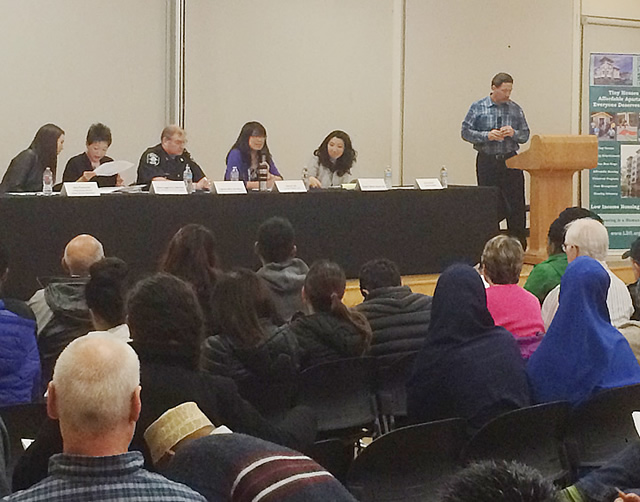
Seattle Councilmember Bruce Harrell addresses Othello residents at Holly House on March 3
The community meetings were held at the New Holly Community Center on February 16 and March 3. Both were in the form of panel presentations. Officials on the panel included Deputy Mayor Hyeok Kim, Councilmember Bruce Harrell, and Sharon Lee, CEO of LIHI. Also there were representatives from the Department of Planning and Development and the Seattle Police. Scott Morrow of SHARE was also in the room to field questions the other members couldn’t answer. (Note: Morrow was removed from his position at another Seattle encampment last month. More info on that story here.)
Both meetings were well attended and included a number of people for and against the camp although, according to neighbors I spoke with, there more people against. Small business owners were particularly worried about the effect a homeless camp would have on the neighborhood, they claimed.
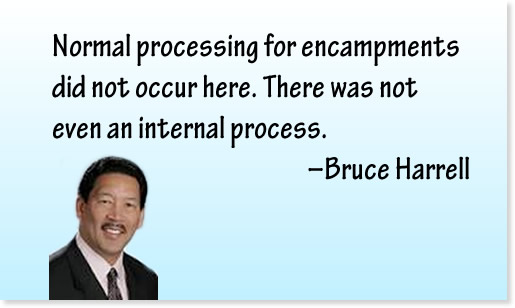 Pete Mahowald lives two blocks away from the encampment site and was in attendance both nights. He described himself as a neighborhood volunteer and sometime spokesperson. Mahowald is unhappy about the sudden way in which he and other neighbors heard about a homeless camp moving in. He told me that construction on the site began two days after the first meeting and before the land-use permit had been issued. At my request, Mahowald sent me pictures he’d taken showing several tiny houses that appeared at the encampment within 48 hours of the first meeting.
Pete Mahowald lives two blocks away from the encampment site and was in attendance both nights. He described himself as a neighborhood volunteer and sometime spokesperson. Mahowald is unhappy about the sudden way in which he and other neighbors heard about a homeless camp moving in. He told me that construction on the site began two days after the first meeting and before the land-use permit had been issued. At my request, Mahowald sent me pictures he’d taken showing several tiny houses that appeared at the encampment within 48 hours of the first meeting.
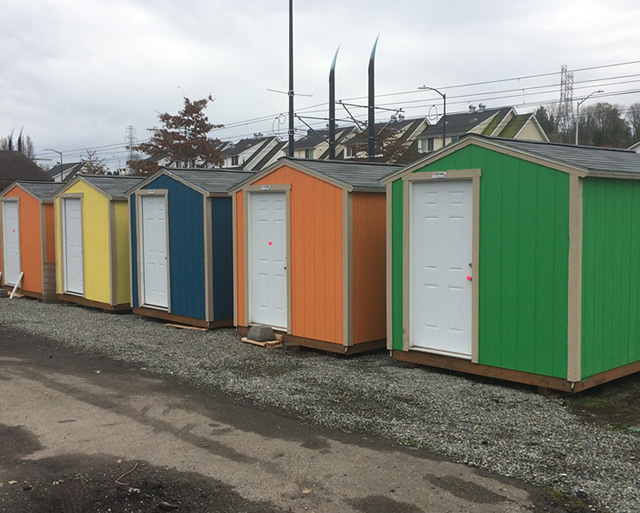
Tiny houses started springing up within two days of the first community meeting
Mahowald was also not pleased with the way the meeting invitations were handled. He said he didn’t get an invitation for either meeting and only heard about them second-hand, despite the fact that at the first meeting he’d put his name on a list to be notified of future events. He brought this up with Councilmember Harrell in the meeting: “Bruce said that e-mails were sent out telling neighbors about the second meeting and when I said I didn’t get one, some 80% of the people in the room clapped. Those people hadn’t gotten a notice either. I know many of them. They’re local business people. Neighborhood volunteers. They found out the same way I did, by word of mouth or someone forwarding an e-mail around.”
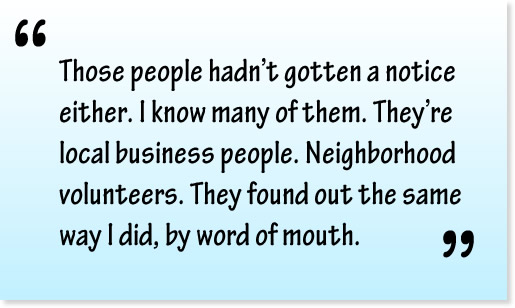 At the first meeting, Mahowald says, he asked whether the camp had already been permitted, and Harrell replied that the permit was still in process and that several things would have to happen before it could be finalized. However, at the start of the second meeting, Harrell announced that Othello Village was a “done deal” and the purpose of the community meeting was to help the City and LIHI address resident concerns going forward. Harrell told the audience that he didn’t have a choice in the matter himself, that he had to push the encampment through because the Mayor had declared a “state of emergency” for homelessness. Harrell was referring to Mayor Ed Murray’s press conference of January 31 in which the Mayor claimed that the city would now have “more administrative authority and flexibility in contracting for services and distributing resources.” How the Mayor’s declaration affects permitting laws remains to be seen. See more here.
At the first meeting, Mahowald says, he asked whether the camp had already been permitted, and Harrell replied that the permit was still in process and that several things would have to happen before it could be finalized. However, at the start of the second meeting, Harrell announced that Othello Village was a “done deal” and the purpose of the community meeting was to help the City and LIHI address resident concerns going forward. Harrell told the audience that he didn’t have a choice in the matter himself, that he had to push the encampment through because the Mayor had declared a “state of emergency” for homelessness. Harrell was referring to Mayor Ed Murray’s press conference of January 31 in which the Mayor claimed that the city would now have “more administrative authority and flexibility in contracting for services and distributing resources.” How the Mayor’s declaration affects permitting laws remains to be seen. See more here.
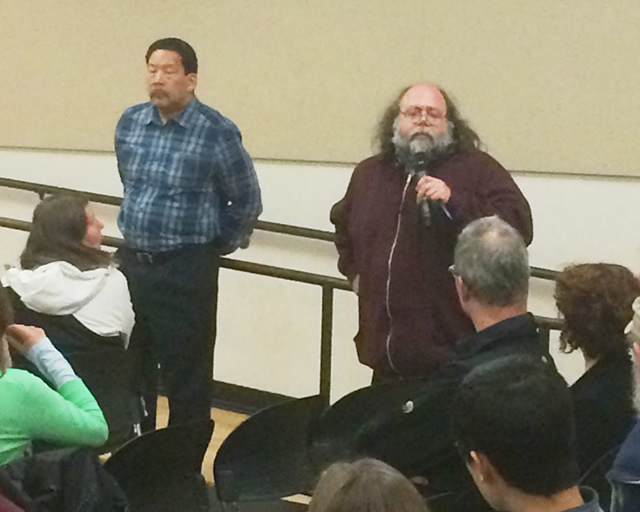
CM Harrell listens as SHARE’s Scott Morrow answers a question. Morrow will oversee the camp’s daily operations.
Organizers claim the camp will have rules of behavior for residents (see a sample intake form here), but Mahowald was skeptical. “They say that the people at Othello Village will not be allowed to buy alcohol within a mile of the camp. How are they going to police that? There are liquor outlets all over that area.”
Another neighborhood activist, Gaye Davies, echoed Mahowald’s account of being left out of the loop. Like Mahowald, she had put her name on a contact list after the first meeting but was never given notice of the second one. She said the panelists spoke for too long before taking questions: “We just sat there and listened and listened and listened. For an hour we listened. A few neighbors managed to interrupt with questions, but one of the things we got over and over was that we’re not in this [decision]. We’re not being consulted.”
Davies told me that her concerns are the impact on the “fragile” neighborhood and the safety of the campers. A former Block Watch captain, Davies has a history of working on crime prevention with neighbors. She gave me examples of crimes that had occurred in the area of Othello Village. “We’ve had deaths in this area,” she said. “We have gun and drug activity. Every few weeks we hear gunfire.”
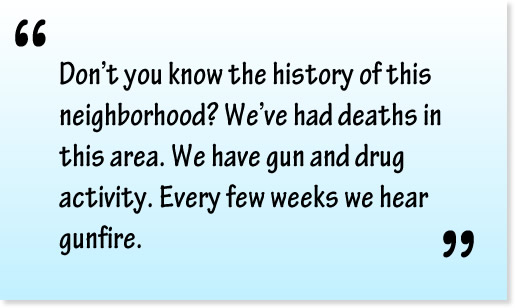
“I keep thinking: Do you people know where you’re putting this? –Right in the middle of a residential area, on the edge of one of the busiest streets in Seattle. Don’t you know the history of this neighborhood? It has improved, yes, but is certainly not a safe location for a vulnerable population.”
Davies has a Master of Public Health degree and she told me that that background informs her concerns about the project. “I keep punching on the public health angle,” she emphasized. “Supposedly they’re going to put in showers and sinks at a nearby mini-mart for the residents. How’s that gonna work? Two showers for a hundred people? The camp will have no hot water. I hate to think of kids in that place, with tents and no water. I have a dog sitting business and the City requirements on me are stricter than this. They tell me I have to have hot water for dogs, but they don’t have to have it for kids?”
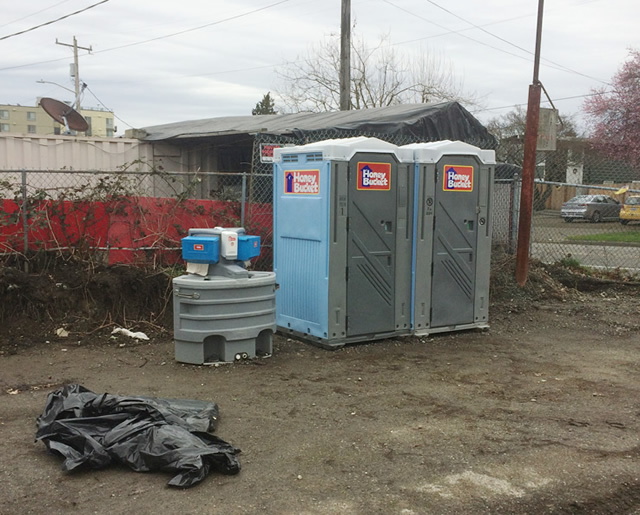
Port-a-potties and a hand washing station will greet the new residents of Othello Village.
At one point, Councilmember Harrell said something so startling Davies felt she had to write it down. She got her note and read it to me. Twice. “He said – and I’m quoting verbatim – ‘Normal processing for encampments did not occur here. There was not even an internal process. It did organically arise.’”
“Now what do you think of that?” she asked. I said the word “organic” made it sound like the camp was something the neighbors were asking for. “Asking for it? We didn’t even know about it, much less ask for it. I would say that at least half of the people at those meetings felt that the Othello neighborhood was being railroaded.”
According to late-breaking news stories, Othello Village will officially open on March 8, five days after the second community meeting.
Story by David Preston. Photos courtesy of Pete Mahowald.
For a somewhat different take on the Othello Village project, see the South Seattle Emerald story here.



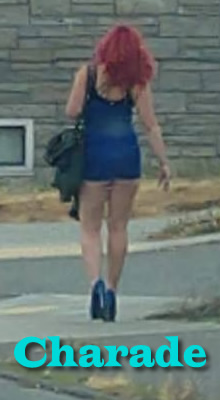
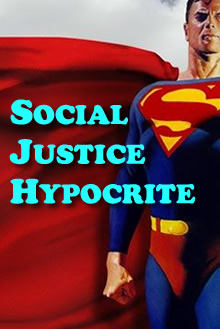
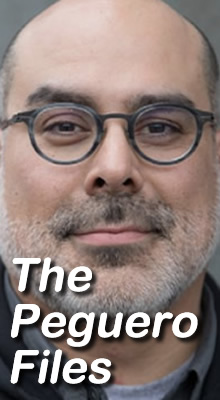
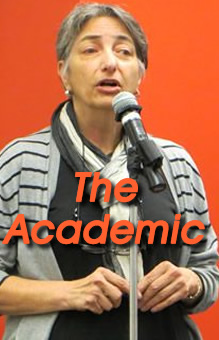
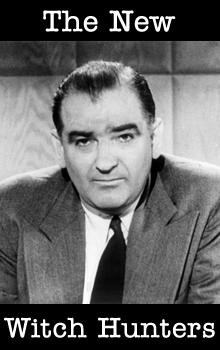


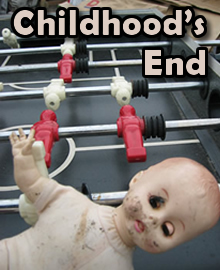

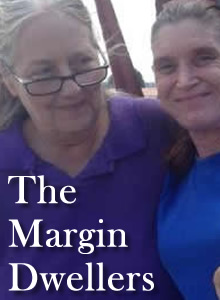




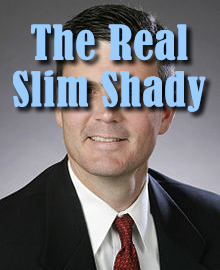


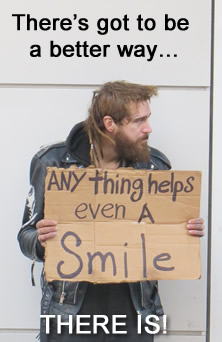
David,
And you wonder why you are ignored by all local politicians and any sort of reliable media outlet? Your reporting is shoddy and your bias against the homeless is immediately apparent. I live in the Othello neighborhood and have been following this story since the beginning. I, for one, am happy that Othello Village is opening. This Nickelsville/LiHi (not SHARE, but let’s not be too specific since you’re a “journalist”) project is needed in the area. I live next to a SHARE shelter, the “Bunkhouse” and they’ve been good neighbors for as long as I’ve lived here (12 years). How does that fit into your narrative? Brother, how many council meetings where you’re laughed off and how many unanswered emails will it take for you to realize you’re just another anti-poor crackpot that nobody will ever listen to? God Bless, David.
The City Council is beginning to care. They’re beginning to realize that Scott Morrow and SHARE are making them look bad, dragging them down. As you can see from this story, there are some pissed-off people in the Othello neighborhood. Do you think I put them up to that?
It’s funny you should mention the Bunkhouse. Over the years, it has attracted car campers and the neighborhood has become very trashed as a result.
Truth hurts huh Roy?
Get your meth there. I can prove it. Donald Casey ordained minister.
No, rats, it’s just that I typically ignore this “blog”, like most folks. I talked to the police reps that showed up to this meeting about the bunkhouse and they said they rarely had to go out there, and if they did, it was because they had themselves called them to remove problematic participants. Nothing about car campers or nuisance complaints. More “journalism”. If you say it on the internet, it must be true,right?
I’ve done a lot of research on SHARE since David posted this. It’s a group of 450 or so homeless and formerly homeless folks that group together to sleep safely and form a community as a means to rotate out of homelessness. Maybe Scott Morrow is their godfather, maybe not. I can’t say because I’ve never been homeless. I do know that SHARE has been providing safe places to sleep for thousands for homeless people for 20 years. I can totally see why DRP and you want to bring it down.
Sleep well, citizen.
Car Campers???? Really??? That is absolutely false. There are NO Car Campers.
As for the Trash, Bunkhouse participants participate in the Adopt a Street Project picking up trash along MLK from Orcas to Graham, as well as the bridge2beach clean up program. Donald, Please don’t Lie about Meth being sold. It doesn’t happen. Telling Lies demonstrates more about you than the lies you perpetrate.
SHARE is King County’s largest, most cost effective emergency shelter provider. We house close to 500 men, women and children in both our indoor and outdoor shelters. SHARE’s unique, self managed, shelter model not only gives individuals living on the street a dry, safe place to sleep but also fosters life skills in its participants that allow them to have a successful, and fulfilling life outside and away from the shelter environment and off the streets. Of course as with anything in life such as school, a class, college and the like, “you get out of it, what you put into it”, and SHARE’s self managed shelter model gives its shelter participants the opportunity to grow, mature, and become good, community minded citizens.
The intrinsic nature of the self managed shelter model fosters communication skills, meeting participation, goal setting, grant proposal writing, shelter operations and leadership, and an intimate appreciation for responsibility. Unlike the traditional shelter model employed by DESC, Union Gospel Mission and Bread of Life that profit from perpetuating homelessness, SHARE, gives its participants a life changing opportunity.
Yes I have been a SHARE participant for 7 months now. I am homeless because I am a domestic violence victim, found myself without a home and can reorganize my life thanks to SHARE.
SHARE gives all its participants the opportunity to participate in it’s finances and I can tell you all that SHARE houses individuals for close to $5.00 per individual per night. We have to participant in SHARE finances because we run the shelters and that includes grant writing, creating and getting budgets passed by the city, and every other nuance of running the shelter operations. SHARE’s 500 participants run everything, with only 8 paid staff members facilitating the shelter participants.
SHARE is an amazing program that does so much more than house people who would otherwise be sleeping out on the street.
The Columbia City/Othello neighborhoods benefit from the active participation of The Bunkhouse participants. This weekend 25-Mar-2016 through 27-Mar-2016 The Bunkhouse participants will be picking up trash on MLK from Orcas and Graham and we, The Men and Women of The Bunkhouse look forward to helping making our community a better place for all its residents.
Thank you all for welcoming us into your neighborhood.